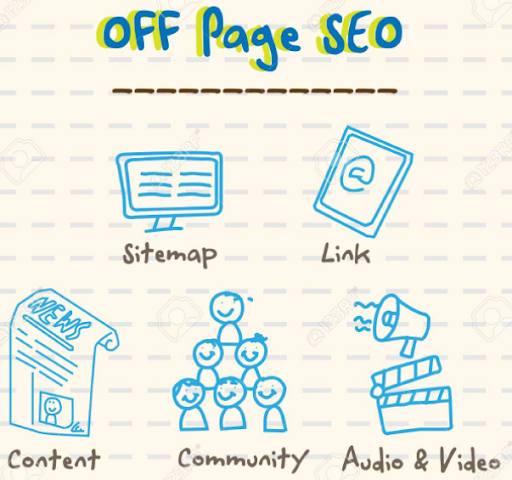Off-page SEO - What is it, and how can it direct traffic to your website?
The internet connects your webpage to the world. But off-Page SEO brings the world to your webpage.
For the benefit of the uninitiated, let’s first refresh what we already know about Search Engine Optimization. Search engines like Google use a complex algorithm while placing you on their Search Engine Result Pages (SERP). To ensure that your webpage does end up on these SERPs, you have to optimize it based on its content. By doing so you can increase traffic inflow to your website. SEO is a set of techniques that helps you to increase this traffic for free, leading to organic improvement in your SERP presence.
On-page SEO is the optimization of the individual web pages and its content. Optimization leads to better rank in the SERP and more traffic through searches. Off-page SEO is done keeping the same outcomes in mind, but it is a technique performed outside the website. As the name suggests, it is, literally, performed ‘off your webpage’.
Off-page SEO
As prominent web influencer Neil Patel observed, “Off-page SEO simply tells Google what others think about your site”. Let’s take the example of Neil himself. We have just mentioned him on our webpage. So in a way, it is off-page SEO for him. His name is appearing in a place outside his webpage. Google’s algorithm will take notice of this. However, a mere off-page mention will not elevate the rank of the website or its owner. Factors like whether the mentioned name is hyperlinked, the relevance of the site where it is mentioned, etc. matters to the algorithm while ranking the subject matter in its SERP.
Technical Insight Into Off-page SEO
We will understand more about the significance of off-page SEO to your business as we understand the nuances of the exercise and how it is achieved.
- Backlinking and Referral Traffic - A discussion on off-page SEO often involves a mention of backlinks. Backlinking is the linking of one webpage to another. As a part of your content, if you include a link from another website, that other website gets a backlink from you. In the reverse situation, you have a backlink from them. Search engines see your backlink on another website as a point in your favor. The more backlinks you get, the more you climb up the ladder in the search engine’s algorithm. As referring domains, i.e. the websites who include your link, increases, your ranking improves and you get more organic search traffic. As your presence in referring domains increase, you become more visible and this reflects on the referral traffic you get. Referral traffic is when the traffic clicks on a link in a referring domain and reaches your webpage.

- Relevance - But then again, the linking should have some relevance for the algorithm to value it highly. For instance, us backlinking a Hollywood movie would have a far less impact on the movie’s off-page SEO, than a backlinking by a popular movie review site. That is because movie review is not exactly our expertise, at least not as an organization.
- Authority and Relevance - Backlinking from referring domains with stronger authority do more towards your off-page SEO. Google has said that it assigns equal authority to all the outbound links in a page. This directly translates that you will get more authority transferred from a page with fewer outbound links, including yours, compared to another referring domain with a lot of outbound links. Apart from relevance and authority, it’s obvious that referral in a high-traffic webpage will send you more referral traffic.
- Placement - Another factor that influences the impact of your backlinks is the placement of your link in the referring domain. Placement in the main text area with standout font and color will make it more likely to get a click. Placement on the footer of the page, on the other hand, with uniform font and color may go unnoticed. The anchor text, the text attached to your link, also needs to be catchy to generate more referral traffic.
- Significance of PageRank - If you use Google as the yardstick for your off-page SEO performance it is important to know that the right kind of backlinking transfers more PageRank to your link. PageRank is the Google metric that ranks your page based on the SEO done.
- Nofollow - One other thing that influences backlinking is nofollow and follow links. Google doesn’t consider nofollow links for PageRank. So being backlinked as a nofollow link wouldn’t mean much for your referral traffic inflow. Created as a technique to tackle comment spam, nofollow has no direct SEO impact. Nevertheless, people can still click on nofollow links and visit your page. Planting your link in a Quora comment is an example of a no-follow link.
How Your Off-page SEO Works For You
It is clear that through off-page SEO your business achieves more visibility on the internet. Your presence goes beyond your website, resulting in the growth of referral traffic to your website. Apart from an organic increase in the number of clicks on your link, the website’s rank increases. The importance of SEO is reflected by a better performance in SERPs. In Google, the PageRank of your webpage increases that influences it’s ranking in SERP.
But how do you end up appearing on someone else’s webpage in the first place?

- Social Network is sure to come up when we talk about the growth of a business online. Given its immense popularity, engaging your social network increases the reach of your content. It also results in the engagement of different IP addresses lending more authority to your link.
- Content Marketing is a more holistic approach to generate more fulfilling engagement. If you have posted a LinkedIn blog, repurpose a video out of it for YouTube, and perhaps a photo campaign for Instagram. You can market your content to reach out to a wider audience with multiple content formats.
- Influencers have a following and authority of their own. By roping them in, you are assured of a wider reach. It could be their feedback or review about your business which can help you generate additional traffic.
- Guest blogging is so powerful as far as you're not compromising on relevancy and other link building metrics. But these days more and more websites ask for an editorial fee. This leaves you with two options as to buy guest posts or do manual outreach by yourself.
- Broken link building is when you identify and contact domain owners of broken links and update them to your pages. This reduces redirects and improves user experience. You link your content to the broken link and contact the web hosting provider to replace the broken link with your link.
- Comments in most places have been rendered useless by the nofollow link strategy. However, it doesn’t stop users from interacting with a comment made on the right platform and relevant topic.
Forum discussions with the right target audience can do a lot of good to your engagement level. A complete profile combined with genuine interactions, advice, and suggestions can help build a community around your website/brand.
- Q&A participation in high-authority platforms like Quora and Yahoo Answers can help you generate good quality content targeted to the right audience. If you manage to place the link in an authentic manner and the relevant place, you can generate good organic traffic from such Q&A participants.
- Social Bookmarking is relevant if you intend to build a genuine community around your brand. Bookmarking sites like StumbleUpon, Reddit, and Digg are major traffic drivers for many businesses, thus highlighting the benefits of SEO through this medium.
- Non-Link off-page SEO –
- NAP citations are the online display of your business details to facilitate easy access and contact. NAP itself stands for Name, Address, and Phone. This is particularly useful for off-page SEO at a local level.
- For Google users, Google My Business is useful for building a local search presence. This free business profile helps in organic local SEO. If your restaurant appears in the “restaurant near me” search, thank Google My Business.
Ensuring that your website loads quickly and choosing an SEO optimized hosting are a basic requirement, which makes on-page SEO critical to your success. In other words, a strong off-page SEO should be preceded by putting the needed on-page SEO strategy in place. Rash off-page SEO activities can tarnish the reputation of the website, as it may be seen upon as intrusive by your audience. Therefore, off-page SEO is successful when done in the right manner, and definitely not at the cost of authenticity and relevance.
Looking for a package of curated course to forge a career? Click here.